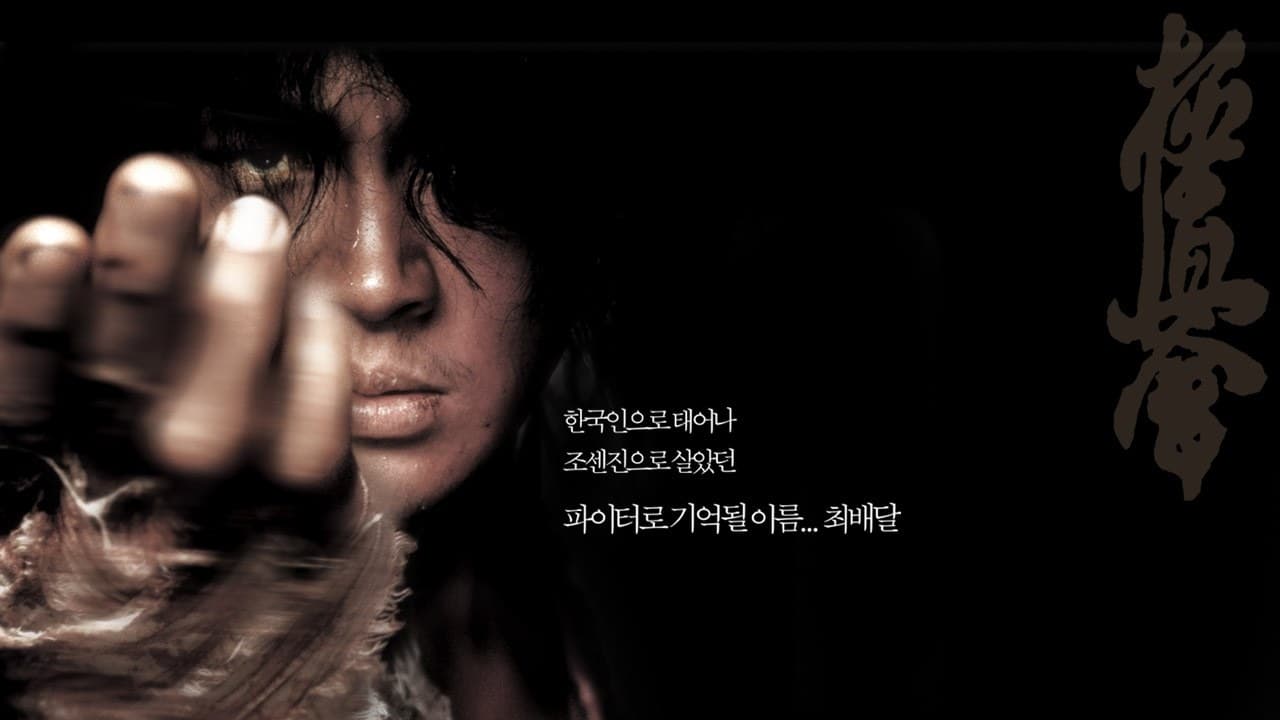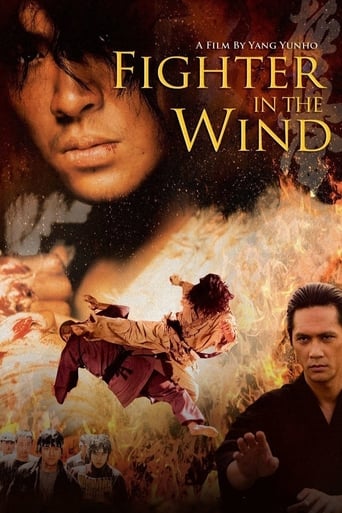Pluskylang
Great Film overall
Twilightfa
Watch something else. There are very few redeeming qualities to this film.
Tobias Burrows
It's easily one of the freshest, sharpest and most enjoyable films of this year.
kluseba
"Baramui Fighter" is a very well done biopic of the Korean national hero Choi Bae Dal who was one of the best martial arts fighters in the whole world and who has gone through loads of hard times as being a part of the Korean minority in Japan that has been shattered by the Second World War and the following cruel occupation by American soldiers and the slow return to form of the country.The movie surely idealizes a little bit too much the main character with this homage and the story reserves not many surprises. A poor Korean boxer gets in trouble with local authorities, isolates himself in the mountains after the tragic assassination of his idol and comes back to become the country's best fighter before he realizes that there are more important things than fighting for its own honour. The story includes some philosophic parts, a typical but very well played subtle love story and a load of breathtaking fighting scenes.It's not only the solid acting or the very well done but not outstanding fighting scenes that make this movie quite entertaining but the authentic portrait of the hard life in Japan after the war. The scenes in the poor quarters of a big Japanese city including gang fights, conflicts with brutal local authorities and an emotional melting pot of honour, identity and passion that are questioned make this movie very addicting. Especially the first forty-five minutes or so of the movie are great to watch, the rest is your solid standard martial arts flick.In the end, anybody interested in Japanese and Korean culture and history might highly adore this movie. Martial arts fan will also like this well done film. Those who like the more emotional and philosophic parts might give this movie some credits but might claim that it could have been more profound. This flick is clearly better than many recent Chinese and Japanese martial arts movies but it can't keep up with the classics of the genre.Note that the very diversified soundtrack of the movie from tradition folk music o symphonic metal came as a positive surprise to me.
DionysoReal
OK folks here is the rebuttal to the one star dis: Korean propaganda you say? So Hollywood is not biased? What about Hong Kong or Mainland China? What about all the Tibetan films coming out against China. What about all the Japanese assertions of superiority and denials of atrocities during WW2? Get the picture? Let me give you some parallels. If your country was invaded and your culture was systematically erased or someone attempted this and succeeded then you have the situation of Native Americans. If you were used as slave labor you have the situation of the African Americans. Japan tried to do both to Koreans and got away with a lot of it. No reparations I know of came out of it. If you think the Native Americans or African Americans are biased they have a good reason to be and you probably will write it off as the past. Don't write off the past. Don't ignore the Legacy inside people. It will come back to bite you.So be mad all you want and call it propaganda but the people you take issue with suffered devastatingly by the people they take issue with. It is till going on today. Check out what Ichiro said about Koreans during the World Baseball Tournament and see the Korean backlash. You really weren't there or descended from either one of these people so you have a rosy picture of Koreans and Japanese. You don't even know the beginning of the injustices, cultural looting, rape and pillaging and slavery that went on. So do some research which you haven't and you will better understand why a bias in a film is nothing compared to what actually happened in real life. Don't you think the film makers wanted to create a strong reaction? If you are still reading thanks for indulging me please forgive any unpleasant tone as it was not directed to any particular group. Just toward an attitude of ignoring a whole peoples'sentiment that is more than justified. The future is a result of the past.Heres my "biased" review Please take with a grain of salt:Like "Yeokdosan" which is a very similar story of a Korean rising in importance to Japan, "Fighter in the Wind" shows a person who overcomes through sheer determination and stubbornness all the popular sentiment of inferiority surrounding him in a nation that is not his. Thus he rises to great status despite the discrimination and attitude of superiority against him. If you would like a less fairy tale and more realistic and slickly produced drama, I heartily recommend "Yeokdosan" which is about a Korean wrestler who becomes a star in America and a legend in Japan.The visuals are a treat. I sense a bit of a limited budget so don't expect the most elaborate settings and extras but enjoy scenes of Power Karate instead of the Hyperkinetic wushu films of late. Yang Don Gun really did a great performance as the MAN. If you saw Rocky or any of Jackie Chan's earlier works you know the story. Underdog gets beat and then underdog finds courage and a trainer and goes back for revenge. Mas Oyama did go to the mountains and discovered something about himself there and the rest is history.If you did just a documentary it would not have the impact that a well produced drama would. You need conflict and memorable characters purposely designed to stir a reaction. You need to show the hatred, fear and injustice to get the people into it. The greater the hardship and the odds the more memorable the story and Character/Hero.
orochi_jr
Baramui Fighter/ Fighter in the Wind is based upon a Manga that tells the story of real life martial artist Masutatsu Oyama, who was the founder of Kyokushinkai Karate, a Karate style that is most famous for it's rigorous training and full contact tournaments. The movie starts off with a young Choi Bae-dal (Oyama's Korean name)who wants to be a pilot to serve his country in the 2nd World War. After the war ended, his dreams of joining the airforce are shattered and as he proceeds and overcomes all kinds of obstacles in his life (discrimination; death of people close to him) we start to witness his growth into the martial arts legend he would one day become. The story may sound simple, but the movie manages to keep it always entertaining and intriguing. Part of this is due to the cast which consists of relatively unknown (Dong-kun Yang as Bae-dal, Aya Hirayama as his girlfriend Yoko) and veteran actors (Doo-hong Yung and Masaya Kato). However, everyone pulls of his role with great enthusiasm, although Masaya Kato doesn't seem to be used to his full potential by the writers. Another positive mention has to go to the great music that en-companies the film throughout. It really fits the mood in each scene and helps bringing out the emotions intended by the director. The scenes that stick out the most in Fighter in the Wind are the training montage in the mountains and, of course, the fights. People who are used to the Wire-Fu of recent Chinese blockbusters will maybe disagree with this because the battles are kept in a realistic style where a fight is over after only a few blows. The fights are all well choreographed and have a gritty, realistic feeling to them, other than most HK movies. It really makes you feel the impact when Bae-dal lands a devastating blow or a jumping kick.Sadly, Fighter in the Wind has some drawbacks that hinder it in becoming an instant martial arts classic. One would be the stereotyping of Japanese: All of them seem to be out to make the Koreans life a living hell. Of course, there were this kinds of problems, but you don't have to remind us every 10 minutes during the film. (Although this topic isn't new to MA movies, as seen in Bruce Lees The Chinese Connection). The other and much greater flaw is the over-Hollywood-isation of Oyama's life. I've always liked the approach of Asian cinema of doing things different, but some scenes in the movie are just ridiculous and could be straight out of some summer blockbuster. If you can live with the aforementioned flaws, then you'll definitely enjoy it. Overall, Fighter in the Wind is well worth your time if you are interested in Martial Arts movies, (Kyokushin) Karate itself, or are just out for a good, entertaining action (but also character driven) movie.
Maomao
I will not talk about the movie summary since it has been covered by other reviewers.I want to explain to people who criticized the fighting scenes to be too short and boring. Some ignorant audience also compared Fighter in the Wind to Jet Li or Jackie Chan attractive choreographed scenes. If you read up about Masutatsu Oyama, founder of Kyokushin Karate, you will know that most of his fights ended in less than 3 minutes (in real life). The first and finishing blow is usually his single punch or single roundhouse kick. Thus Fighter in the Wind is only reflecting the truth of Mas Oyama's fighting powers. He was nicknamed 'Godhand' because of his deadly single moves.Movie trivia #1: Most of us would have heard of Street Fighter by Capcom. Do you know who is Ryu? The style and appearance of Ryu was actually inspired from Mas Oyama. We all know that the infamous enemy of Ryu was Sagat. Sagat was inspired from a famous Thai kickboxer who once challenged Mas Oyama. It was a good long fight and Oyama won the fight with heavy injuries.Movie trivia #2: Over many years, Mas Oyama has won XXX times and lost only 1 match. I believe he lost to a 80 year old Taiji master from Hong Kong.Justice without strength is empty, but strength without justice is violence.Mao points: 8/10

